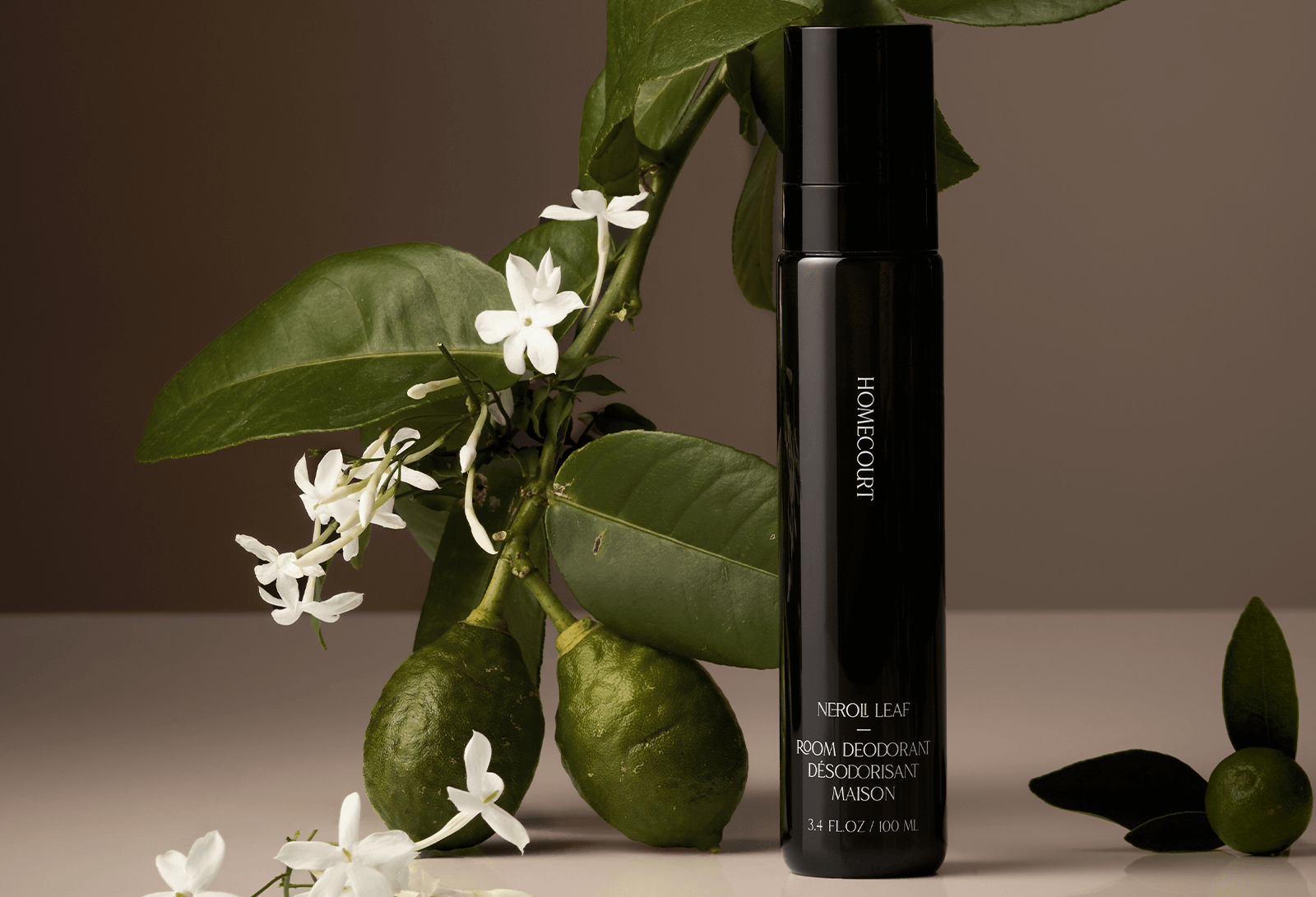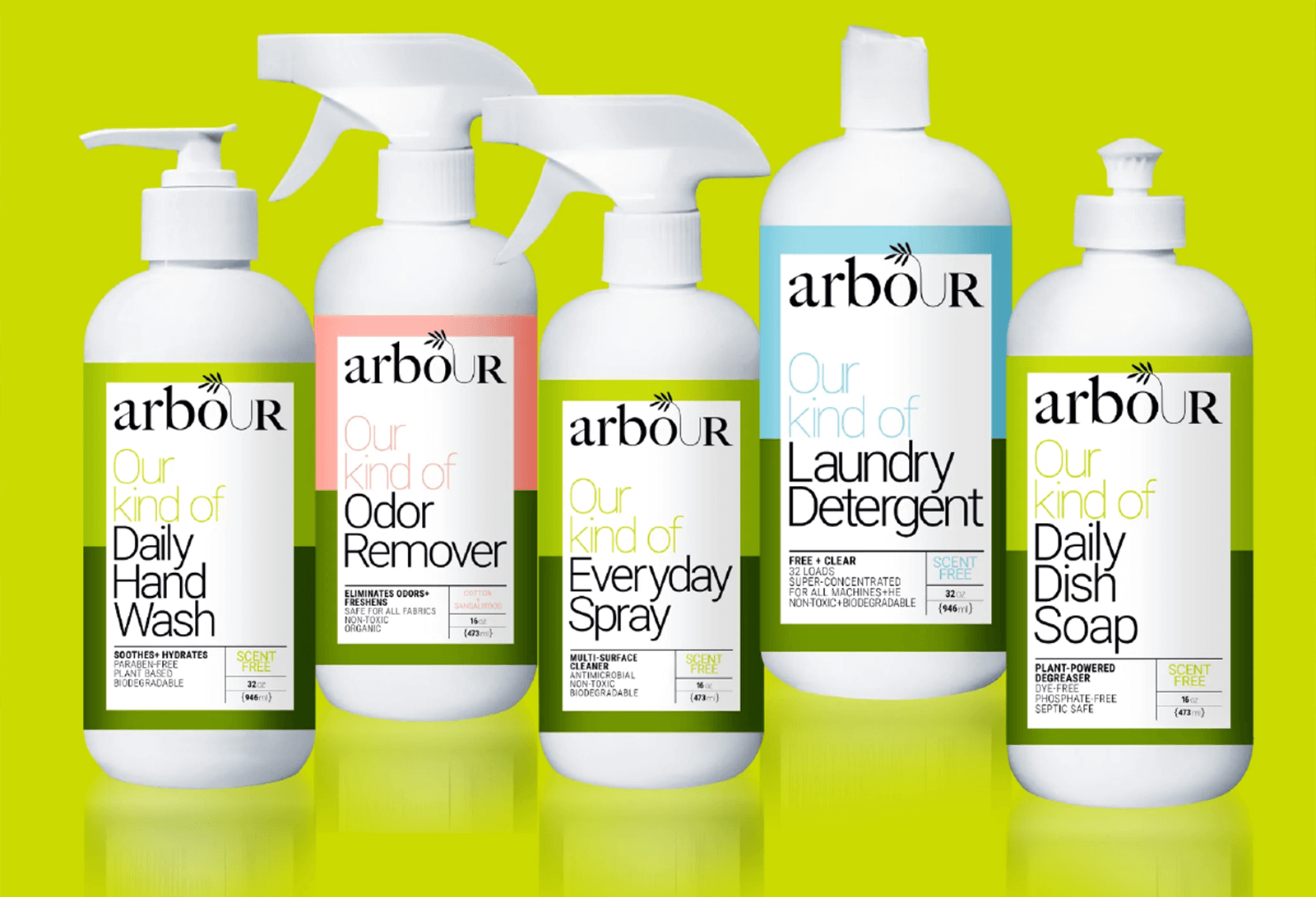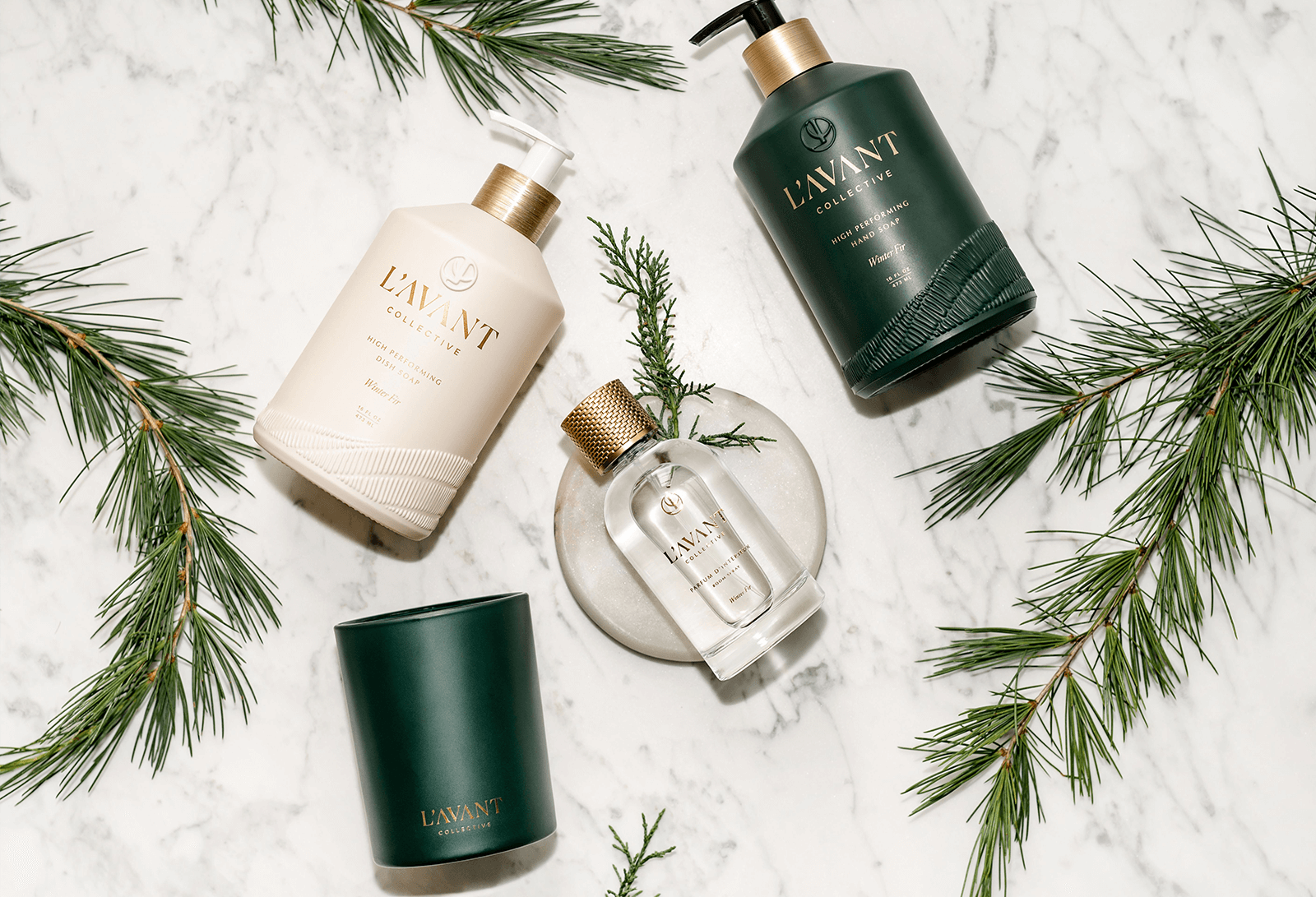Aside from the bulging biceps of Mr. Clean, the home care category had little sensuality to offer. On the sustainability front, natural alternatives to heavy-duty bleach oftentimes failed to deliver the same powerful cleaning properties as their mainstay alternatives. Fragrances were limited to Pine-Sol or eye-stinging citrus—in short, little luxury to be had. New contenders in the market are looking to change that, with eco-conscious creations that visually elevate the genre to chic new heights.
Homecourt, founded by Courtney Cox and Sarah Jahnke (former Head of Marketing for Viktor&Rolf and Proenza Schouler Fragrances at L’Oréal), includes dish soap, surface cleaner, and room deodorants in four complex scents—the sweet and smoky leather Cece, the full-bodied floral Steeped Rose, uplifting citrus scent Neroli Leaf, and aromatic green fragrance Cipres Mint—created by Jerôme Epinette, the nose behind plenty of Byredo’s bestsellers, among other industry accolades. Ingredients include scenting agents like upcycled rosewater, skin-friendly ingredients such as glycerin in dish soap to moisturize hands, and coconut-derived degreaser to clean naturally. Bottles and boxes are made with 100% post-consumer recycled (PCR) materials, while formulas are free from phthalates, foaming agents, and detergents. “Collectively, we seek good health, good habits, and wellness routines that make us feel like we are putting our best foot forward—so why not extend that philosophy into homecare?” Cox states in her founder’s mission. Looking to elevate the experience of everyday home maintenance, Homecourt blends fragrance artisanship with wellness culture and an ingredient-conscious approach.
Cox isn’t the only celebrity looking to overhaul our daily spritz-and-wipe routines. Drew Barrymore, the Global Brand and Sustainability Advocate for sustainable retailer Grove Collaborative (which aims to be 100% plastic-free by 2025), partnered with the company on an 11-piece collection of household products.
“I wanted to create a line of home accessories that were bright, modern, and inspired by the beauty of the natural world. Every piece was designed and crafted to be sustainable, beautiful, and effective for the health of people and the planet. I hope the collection inspires others to take action and embark on their own sustainability journey—making it easier to use less plastic in their daily lives,” Barrymore stated. Available in vibrant peach, green, and sunshine yellow colorways, the products are scented with limited-edition, 100% natural Island Orchid and Palm Leaf Mist fragrances. Formulas are built on pre-existing Grove Collaborative beststellers such as multipurpose cleaning concentrates and reusable dish cloths.
The global household cleaning products market is expected to hit $77.13 billion in 2030, with a CAGR of 6.5%. Fragrance as a wellness practice, the search for an Instagram-friendly aesthetic, and increasing scrutiny of household ingredients and sustainability practices are expanding the consumer audience looking to purchase these updated products. L’Avant Collective is a plant-based cleaning and home fragrance line founded by Lindsay Droz and Kristi Lord. Both working mothers (Droz in Cardiac Rhythm Management at Boston Scientific and Lord as COO at Chinus Asset Management) and pet owners, they were looking to merge nontoxic formulas with a pleasing visual identity that was conscious of the planet. “When you ask someone, why don’t you use eco-friendly cleaning products, they typically answer with ‘because they don’t work.’ Our mission every day is showing people how eco-friendly products can outperform traditional cleaning products—L’Avant is the first step to that,” Droz and Lord tell BeautyMatter.
All products are free of petroleum compounds, containing organic materials, and over 98% natural components. The brand’s multi-surface cleansing wipes are biodegradable, and L’Avant Collective also offers refill models for its dish soap, multipurpose surface cleaner, and hand soap products. Its trademark Fresh Linen scent contains notes of ylang-ylang, geranium, and lavender, although the company also offers unscented options for those with fragrance sensitivities. Getting to this end product was not without its hurdles.
“The main challenges that were important for us to conquer were performance, stability, ingredient sourcing and ensuring the preservative system kept our products from growing bacteria over time,” the founders state. “They had to work as well as the conventional, toxic products that were on the market. With every formulation, we sent the formulas to be third-party tested against the market-leading conventional products. We would not settle on our formulation until they either beat the performance or clearly met the performance of what we were comparing to.” The duo formulated the cleaning products under European guidelines and dove deep into the supply chains of their potential business partners and product formulators to ensure they were in line with their vision.
When asked about why it has taken so long for the cleaning product market to become more cosmetically elegant and ingredient-conscious, the founders reply: “Once we got into this market, we realized why more people don’t enter it. It took us almost three years to bring our first products to market and a lot of our savings to do this. Creating cleaning products that are both eco-friendly and high performing while also in beautiful, sustainable packaging requires a large investment—both time and financially.”
L’Avant Collective’s customer base is described as between the ages of 25-45, a metropolite, and willing to invest in eco-friendly products that embody their own aesthetic. Droz and Lord see more room for growth in the future. The company recently launched a laundry line, complete with wool dryer balls and laundry oil to replace dryer sheets and a 5x concentrated detergent formula that allows consumers to use less and be able to wash at lower temperatures.
Arbour was founded by another female powerhouse: Carol Mehas, former SVP in Marketing at L’Oréal. Spending increased time at home during the pandemic saw her turn her cosmetic acumen towards developing a green cleaning line that delivered on efficacy thanks to the hero ingredient of soapbark.
“Knowing that esters (derived from acids), SLS/SLES (which are various sulfates that can become cancerous during the manufacturing process), and other harsh chemicals are responsible for achieving the ‘squeaky clean’ feeling most customers expect are so harmful to skin, pets and children, we wanted safe products that were environmentallyfriendly that actually worked—that is why our tag line is ‘Our Kind of Clean,’” she tells BeautyMatter. Arbour’s formulation process harnessed the pre-existing formulas and technologies from the professional cleaning worlds of restaurants, school, and hospitals.



“Turns out, there are many industries that are formulating products to be safe, nontoxic and biodegradable due to increasingly stricter Federal and State Government mandates for eco-friendly products. We’ve borrowed these technologies, causing incredible rediscovery and reformulations of natural-based products by our chemists to provide both safe and effective products,” Mehas states. “This is something that no other brand is offering, and we know that Arbour products are winning the hearts and minds of savvy consumers.”
Only GRAS (Generally Regarded As Safe) ingredients made the cut, and products like the Free+Clear Laundry Detergent are certified asthma and allergy friendly. Mehas anticipates doubling the business year over year, with potential retailer and industrial supply expansions in the future.
Its branding also speaks to reaching a wider audience. “Arbour products set out to break the mold of ‘only housewives clean house.’ We decided to make cleaning ‘more cheerful, less choreful’ by creating fun activities, music, and hacks to make a necessity of everyday life feel like an adventure,” she explains. Its online presence has a “treehouse” section where customers can find Spotify “spraylists” to invigorate the process of the everyday task. Arbour’s approach is relatable, down to earth, and inviting for potential new customers. “We have found that everyone wants to do their part in protecting our environment, and tiny, non-disruptive changes can make a huge difference in protecting our planet. People are realizing how easy it is to change up a few things without sacrificing quality—and that is the reason that consumers are more open to making better choices,” Mehas states. “We know that if products are fun, accessibly priced, and family friendly, they are exactly what consumers want.” As for the company’s future assortment, the Arbour team is currently working on expanding into outdoor living and garden products to clean not just inside, but outside of the house as well.
Blueland has found a shining spot in the cleaning landscape. It’s raised $20 million in investment and eliminated over 2 billion plastic single-use plastic bottles and counting through its “buy once, use forever” BPA-free glass and Tritan bottles. With powder and tablet refill formats, they have also reduced the need for water in formulas, as customers simply drop the solids into water to fill up containers as and when needed. A mere four years after being founded, the brand became profitable. It is stocked nationwide at Target, Costco, The Container Store, and Bed Bath & Beyond.
To create its market-first cleaning tablets, the laundry and dishwasher version of which also are sold “naked” instead of individually wrapped to reduce further waste, the company went the extra mile, setting up its own laboratory to develop a formula in-house and going through the difficult process of finding a manufacturing partner who was able to work on this format (whereas most in the cleaning genre work on liquid cleaning sprays instead of dry formats). Co-founder and CEO Sarah Paiji Yoo also highlights two further challenges: sourcing the brand’s proprietary packaging, as the company was the first to offer refills in compostable paper instead of plastic packaging; and ensuring the sustainable credentials of their supply chain. Blueland has Cradle 2 Cradle, EPA Safer Choice, EWG, Climate Neutral, and Leaping Bunny certification, as well as having B Corp status.
Reaching this immense level of success meant convincing investors and consumers alike of a completely different format. “The concept of refilling your cleaning products and using your own water at home was a new but intuitive concept that we were able to effectively raise awareness for. Now, it's a mainstream consumer trend in the US, with 40% of consumers interested in refillable packaging for their cleaning products,” Yoo explains.
Today, the company has reached over 1 million customers, seen 200% growth year over year, and garnered over 70,000 5-star reviews for its products. And with that success story also comes the opportunity for its sustainability message to positively impact other industries. “While our rapid growth has been amazing for our mission and business, it has in turn attracted attention from both large CPG players as well as aspiring entrepreneurs with their own versions of our offering,” Yoo proclaims. “It’s been great to see that even outside of the cleaning category, more brands are beginning to encourage consumers to consider refillable packaging, instead of single-use packaging, to push all of us towards a fundamental change in how we shop and consume.”
Blueland spent three years developing and researching to create a powder-based gel format, which resulted in the brand’s first personal care product that launched into 250 Target doors—another exciting opportunity to vastly reduce packaging waste, which Yoo points out is the largest generator (46%) of all plastic waste. “If we were to reuse just 10% of those products, we could prevent almost half of the annual plastic ocean waste. After conducting research to understand what products would enable Blueland to have the largest impact on waste prevention, both body wash and facial cleanser rose to the top. Tackling two of the highest-frequency and bulkiest products meant the team could achieve the greatest impact in reducing single-use plastic with only two products,” she explains.
Whether a founder’s ambition is to create an aromatic haven in the home or to transform the industry’s and consumers' sustainability practices, there is plenty more exciting innovation ahead in the cleaning category. Move over Mr. Clean, these female founders are mopping up the competition.